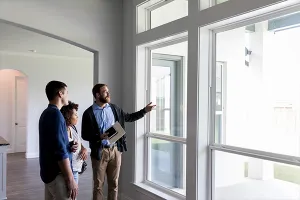
Buying that first house is a rite of passage that most Americans still dream of—but it’s not getting any easier to achieve. The median age for a first-time buyer today is 38, up from 31 a decade ago.
Today’s buyers face challenges their parents often didn’t—a combination of student loan debt, inflation, high interest rates (though nothing close to the stratospheric 20% of 1980) and lean inventory. While some markets are seeing cooling, Angie Golembiewski, SRES, C2EX, of Baird & Warner in Chicago’s northwest suburbs, says her area remains a seller’s market, with sales going over asking prices and multiple offers if a house is in move-in condition.
In other markets, climate challenges are adding to angst. “Getting a house with adequate protection from hurricanes can be difficult for some first-time buyers, who are limited by price in our South Florida location,” says Sandra Sorge, a broker-associate with Illustrated Properties in Jupiter.
Sorge did have a recent listing sell to first-time buyers, who liked the home’s impact-resistant windows and fairly new roof. The buyers had withdrawn from a prior contract when the roof failed to pass inspection and the sellers wouldn’t provide a credit, she says. “Roof age is a major issue. If the roof is more than 20 years old, it can be tough and expensive to get insurance.”
No wonder some would-be buyers are feeling disheartened. A 2024 Harris poll found that 61% of renters said they don’t expect to become homeowners. Those who find a way to cross the finish line may be exhausted and have few funds left to furnish or remodel the home when they move in.
Ironically, there have never been more trendy resources and technologies aiming to ease a home purchase. Online and mobile apps enable would-be buyers to easily see what’s on the market, learn the process, apply for a mortgage, track transactions, and even see which paint colors would look best on the walls. Yet, despite all the bells and whistles available to consumers today, there’s still only one professional to guide buyers through confusing property comparisons, shifting prices and interest rates, worrying inspection issues, emotional negotiations, dashed hopes, and finally (hopefully, thankfully) the purchase of their first home.
That professional is you, of course. Since 2020, the National Association of REALTORS® has been showcasing your work and educating consumers through the streaming series “First-Time Buyer.” In every episode, a real estate agent who’s a REALTOR® guides buyers through their purchase. Season 5 of “First-Time Buyer” launched Jan. 30 on Hulu, Facebook, YouTube and FirstTimeBuyer.realtor. It features eight new episodes set in New York and Connecticut. See episode teasers below.
The show also inspired us to cast a net into other parts of the country. Here, meet the real estate pros who helped first-time buyers Matthew Marin, Matt Dennis, Kyra Drescher, and Sheleah Walton travel the road to home-ownership. By sharing such stories, you can help clients see the challenges and opportunities that come with purchasing a home. Such stories can also help you when you’re navigating the new rules of residential real estate. Those are: When you work with buyers today, you must walk them through your services upfront and specify how much you charge. Before you show property, in person or virtually, you need to get a signed written buyer agreement.
“We advise our buyers [who can’t afford to pay for the agent’s services] to request that sellers pay through the transaction,” says Golembiewski, echoing practices that many have adopted since the rules went into effect in August 2024. If the sellers won’t pay, buyers may consider factoring the fee into their offer price or seeking concessions to cover expenses. Or they may choose to move on to another property, she says.
Get more helpful tips at nar.realtor/consumer-guides.
As you walk through your services, remember that most buyers today still want to work with an agent. NAR’s 2024 Profile of Home Buyers and Sellers showed 86% of home purchases were made through a real estate agent or broker, and 88% of buyers said they’d use their agent again. Your knowledge, problem-solving ability and handholding are valued, especially by those going through the process for the first time.
A Word About HOA Fees
Many starter homes are condominiums, townhomes or single-family homes in communities with a homeowners association. When you’re showing units that are part of an HOA, help inexperienced buyer clients understand the associated fees and what they cover.
Some HOAs fund a range of services and amenities; others cover only basic maintenance. Fees vary widely, sometimes not in direct proportion to what amenities are offered. The number of units, property age and amount of maintenance needed are all factors.
Stephanie Mallios, ePRO, a salesperson with Compass in Short Hills, N.J., advises buyers to read through 24 months of HOA board meeting minutes for a history of work completed, discussions of future expenses, and an understanding of how proactive the management company and board are regarding repairs and reserve funds. She cautions buyers with specific HOA questions to seek the guidance of an attorney, financial adviser or other qualified professional.












